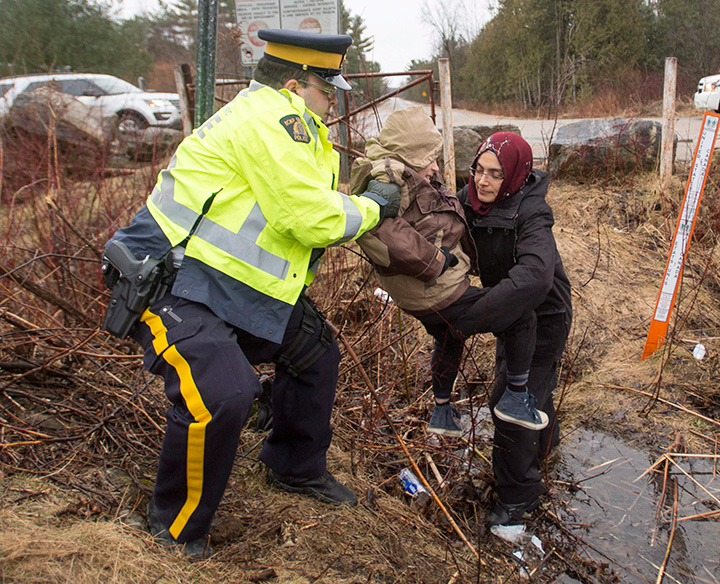Over 1,600 asylum seekers were intercepted by the RCMP as they crossed the Canada-U.S. border between legal checkpoints in November, a number that is sure to prove discouraging for Canadian officials trying to stem the tide of arrivals.

The final tally for November — 1,623 — was released on Tuesday afternoon, and represents a slight drop from October. But it is still nearly double the totals that immigration officials were seeing in the spring. In June, for instance, 884 people crossed illegally and were detained. In May, the number was 742.
READ MORE: Asylum seekers get health-care benefits first, eligibility questions later
Over the summer, word seemed to spread among diaspora communities in the United States that by crossing between border checkpoints, asylum seekers are typically able to make a claim in Canada rather than automatically being sent back to the United States under the Safe Third Country Agreement.
The number of arrivals, especially in Quebec, promptly soared. November’s total pales in comparison to the 3,134 and 5,712 people who crossed and were intercepted in the hot months of July and August, respectively.
WATCH: An irregular crossing into Canada is no free ticket into the country, says Goodale

But the numbers still aren’t dropping down to the levels seen in the spring, either, in spite of repeated trips to the U.S. by Liberal MPs with connections in Haitian and Latin American communities.

Get daily National news
“Members of Parliament and Minister Hussen have travelled to Florida, New York, Texas, California, and Minnesota where they met with diaspora community leaders, NGOs, immigrant-serving organizations, members of the legal community, and government officials in order to explain how our asylum system works and counter misinformation,” said Hursh Jaswal, spokesperson for the office of Immigration Minister Ahmed Hussen.
“Minister Hussen has recently met with the U.S. Ambassador and will be speaking with the new U.S. Secretary of Homeland Security in the near future.”
Quebec remained the hot-spot for irregular crossings in November, with 1,539 of the 1,623 arrivals intercepted while entering that province. Another 46 people crossed irregularly into British Columbia and 38 into Manitoba.
In total, between January and November, 45,785 asylum claimants have been processed by the Canada Border Services Agency and Refugees and Citizenship Canada. That includes people who arrived between border checkpoints, as well as those who made claims at legal checkpoints or inland.
That means that with one month still left to be counted, 2017 has already claimed the top spot for most asylum claims in a single year since 2001, when 44,640 people made a claim.
“Those who are determined to be genuinely at risk, are welcomed,” said Jaswal on Tuesday.
“Those who are determined not to be in need of Canada’s protection, are removed. For instance, based on cases finalized to date, only 10 per cent of asylum claims submitted by Haitians who entered Canada this year are being accepted.”
WATCH: Asylum seekers stealing opportunities from those facing ‘real persecution’: Scheer

One possible explanation for the continuing surge could be the urgency created by recent announcements made by the White House, which has decided to lift protected status for tens of thousands of citizens of countries like Nicaragua and Haiti.
Public Safety Minister Ralph Goodale has said Canada is prepared to cope with any additional influx that comes our way, and that the process for applying for refugee status will remain rigorous and put the safety and security of Canadians first.
But backlogs have already developed at the Immigration and Refugee Board of Canada, meaning that people are waiting months to find out if they are even eligible to make a claim. Conservative immigration critic Michelle Rempel, meanwhile, has complained that she has been repeatedly stymied when trying to get more information out of the government.


Comments